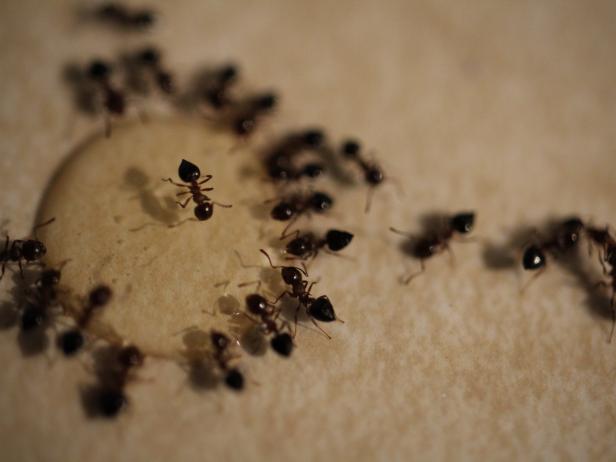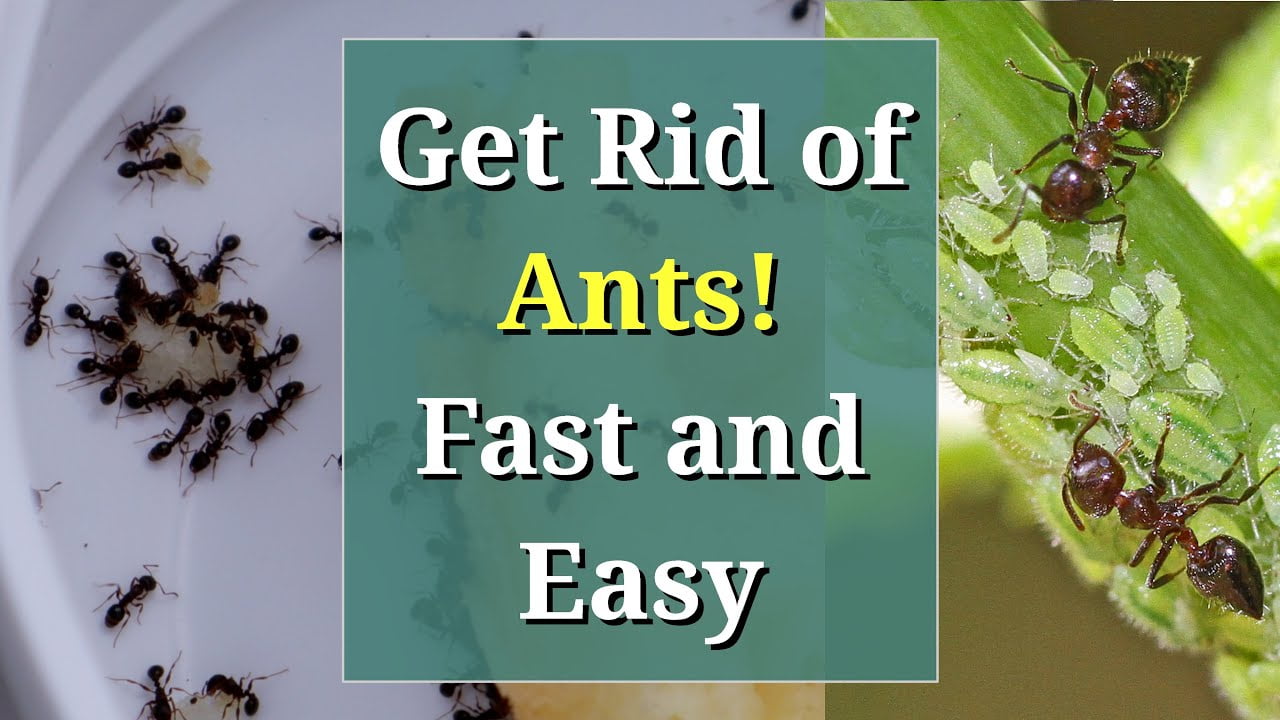Remove ant eggs from your garden by gently collecting and relocating them to a non-disruptive area. Ensure you wear protective gloves to avoid bites and stings.
Cultivating a flourishing garden goes hand in hand with encountering a myriad of inhabitants, some of which can be less welcome than others. Ants and their eggs are often found nestled among plants and soil, signifying a healthy ecosystem, yet possibly hinting at an underlying pest issue.
For environmentally-conscious gardeners, the discovery of ant eggs presents a challenge that calls for a delicate balance between pest control and ecological preservation. The key lies in finding effective, non-toxic methods to manage these tiny architects without harming the garden’s biodiversity. By relocating ant eggs, you not only maintain the intricate web of garden life but also safeguard your plants from potential ant-related damage.

Credit: www.hgtv.com
Ant Eggs In The Garden: Initial Sightings
Discovering ant eggs in your garden isn’t something to overlook. It’s essential to identify them early. Act promptly to prevent these tiny architects from turning your green space into their nursery. Let’s explore signs of ant eggs and understand why they’re in your garden.
Spotting Ant Eggs: Signs To Look For
Ant eggs are tiny but noticeable with a keen eye. Look for small, white, oval-shaped objects nestled in the soil. You might find them under rocks or inside plant pots. Ants tend to hide their eggs in sheltered, moist areas. Vigilant garden monitoring is key to catching these signs early.
- Small piles of soil indicating nest sites
- Visible ant trails leading to nesting areas
- Unusual plant damage may signal ant activity
Ant Biology: Why They’re In Your Garden?
Ants choose gardens for a reason. Abundant food sources, like aphids’ honeydew, attract them. Moisture from watering provides perfect egg-laying conditions. Understanding this helps in deterring them.
| Reason for Ant Presence | Resulting Action |
|---|---|
| Seeking Food | Remove food sources or control aphid populations |
| Moist Soil Conditions | Improve drainage to discourage nesting |
| Shelter in Debris | Keep the garden clean and clutter-free |
Impacts Of Ant Colonies On Your Garden
Finding ant eggs in your garden can trigger a mix of feelings.
It’s vital to understand how ant colonies affect the ecosystem.
Beneficial Aspects Of Ants In Ecosystem
Ants play a crucial role in our gardens.
- Aerate soil – They dig tunnels.
- Decompose organic matter – Enhances soil fertility.
- Control pests – They eat other insects.
Potential Harm To Plants And Soil
However, ants can also be problematic.
- Invasive species can threaten native plants.
- Disrupt roots – Their tunnels might harm them.
- Farm harmful pests – Such as aphids for their secretions.
Understanding these aspects helps you make informed decisions about your garden.
Assessing The Situation
Discovering ant eggs in your garden can be an unsettling experience. To address this issue effectively, it’s essential to understand the extent of the ant presence and the species involved. Effective assessment paves the way for targeted action, helping to protect your plants and preserve your garden’s health. Let’s delve into the specifics of evaluating this tiny but potent problem.
Determining The Scale Of Infestation
Understanding the scope of the ant infestation is crucial. Check for these signs:
- Quantity of ant eggs seen.
- Number of visible ant trails leading to and from the nest.
- Size and spread of the nest itself.
A larger infestation may require more intensive measures.
Identifying The Ant Species
Ants come in various species, each with distinct behaviors and preferences. Identifying the ant species is a step closer to resolving the issue. Consider these tips:
| Feature | Common Species | Preferred Habitat |
|---|---|---|
| Color | Black, Red, Brown | Gardens, Paved Areas |
| Size | Small to Large | Soil, Under Rocks |
| Behavior | Carpenter, Fire, Sugar Ants | Wood, Moist Areas, Kitchens |
Each species requires a unique approach for management. So, identifying them correctly is necessary.
Non-invasive Ant Egg Removal Strategies
Discovering ant eggs in your garden can seem overwhelming. Do not fear! There are non-invasive ant egg removal strategies you can employ to protect your green space while respecting the ecosystem. The key is to approach the situation with care, opting for methods that deter ants naturally and enable safe nest relocation without resorting to harsh chemicals or disruptive practices. Let’s explore some effective techniques.
Natural Deterrents And Repellents
Implementing natural deterrents ensures a safer garden for everyone. Ants react to certain smells and substances, making this approach beneficial. Here are some repellents you can use:
- Cinnamon: Sprinkle ground cinnamon around plants.
- Vinegar: Spray a mixture of water and vinegar near the ant colony.
- Citrus Peels: Leave citrus peels to ward off ants.
- Coffee Grounds: Scatter coffee grounds; ants dislike the smell.
Relocation: Moving Ant Nests Without Harm
Relocating ant nests is a gentle method to handle your garden dwellers. Try these steps for effective relocation:
- Find the Nest: Carefully track down the main nest.
- Prepare a New Site: Choose a spot far from your garden.
- Use Shovels: Gently dig around and under the nest.
- Transfer the Nest: Place it in a container and move to the new location.
- Observe: Ensure ants settle in their new home.
Employing these gentle strategies can make a huge difference in your garden’s health. By using natural remedies and considering the ants’ need for a safe home, you create a balanced garden ecosystem. Remember to be patient and persistent. Ant colonies may take some time to relocate completely.
Chemical And Invasive Measures
Discovering ant eggs in the garden signals the need for immediate action. For a swift response, chemical and invasive measures can be effective. Let’s explore methods to ensure your garden remains a thriving ecosystem.
Choosing The Right Pesticides
Selecting an appropriate pesticide is crucial for controlling ants without harming your plants. Consider the following:
- Ant specificity: Opt for ant-specific formulations to prevent collateral damage.
- Environmental safety: Choose eco-friendly chemicals that break down quickly.
- Application method: Decide between baits, sprays, and granules based on garden size.
How To Safely Apply Chemicals In Your Garden
Safety during application ensures protection for both you and the environment.
- Read labels: Always follow the manufacturer’s instructions.
- Wear protection: Use gloves, masks, and long sleeves during application.
- Keep children and pets away: Ensure they remain at a safe distance.
- Apply sparingly: Use the smallest effective amount to minimize impact.
- Avoid water sources: Prevent chemicals from contaminating ponds or streams.
By following these guidelines, your garden will be ant-free, thriving, and safe.
Prevention And Ongoing Garden Maintenance
Finding ant eggs in your garden suggests a thriving ant colony. Don’t worry! You can keep these tiny architects in check. Your garden’s health and beauty stay untouched with prevention and ongoing maintenance. This guide outlines simple, effective strategies to build an ant-resistant garden and establish regular garden patrols for ant activity.
Cultivating An Ant-resistant Garden
Transform your garden into a fortress against ants. Focus on creating an environment that discourages ant colonies from settling. This includes selecting ant-repellent plants and maintaining a clean garden. Here’s how:
- Choose ant-repellent plants: Some plants, like mint and lavender, naturally deter ants.
- Maintain a tidy space: Clear away debris and spillage that could attract ants.
- Use natural barriers: Diatomaceous earth and cinnamon work well as ant deterrents.
Regular Monitoring And Proactive Measures
Stay ahead of ant invasions with regular garden check-ups. Early detection is key to controlling ant populations. Combine visual inspections with natural interventions for a comprehensive approach:
- Inspect plants and soil: Look for ant trails and eggs regularly, especially in warm weather.
- Intervene early: Spot treatment with boiling water or soapy solutions can halt growing ant colonies.
- Mulch wisely: Organic mulches can harbor ants; consider inorganic options like stone or rubber.
Frequently Asked Questions For What To Do If You Find Ant Eggs In The Garden?
Should You Kill Ant Eggs?
Ant egg removal can prevent infestations. Consider natural deterrents before killing them; if necessary, use eco-friendly pesticide options with caution.
Should I Kill Ants In My Garden?
Killing ants in your garden isn’t generally necessary unless they’re causing significant harm. Ants can actually benefit soil aeration and nutrient recycling. Consider non-lethal control methods if they’re problematic.
How Do I Get Rid Of Ants And Eggs In My Garden?
To eliminate ants and eggs in your garden, use a mixture of dish soap and water as a natural pesticide spray. Diatomaceous earth sprinkled around plants acts as a non-toxic barrier. Introduce ant predators, like nematodes, to naturally reduce the population.
Regularly remove any food sources and debris.
Are Ants In My Vegetable Garden Bad?
Ants in your vegetable garden can be both good and bad. They aerate the soil and control pests, but can also protect garden pests like aphids. Monitor their activity closely.
Conclusion
Discovering ant eggs in your garden doesn’t have to spell disaster. With swift action and natural control methods, you can protect your green space effectively. Remember to maintain your garden’s balance, as it helps deter future invasions. So, the next time you spot these tiny intruders, you’ll be ready to tackle them head-on, ensuring your garden’s health and beauty.

I’m MD Tanvir, and I bring years of expertise gained from working closely with pest control companies to the forefront. My journey in the industry has inspired me to launch Bug Battler, a platform aimed at equipping people with the know-how to combat pests autonomously. Through Bug Battler, I aim to empower individuals with practical insights to tackle pest infestations effectively.

